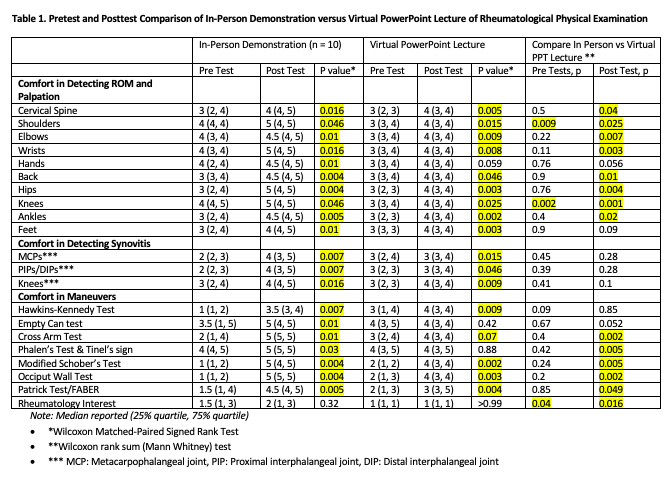Session Information
Date: Monday, November 9, 2020
Session Type: Poster Session D
Session Time: 9:00AM-11:00AM
Background/Purpose: The musculoskeletal exam is critical to rheumatologists for evaluating and diagnosing patients with joint pain. The goal of our study was to compare differences in comfort and satisfaction level among internal medicine residents after receiving a single in-person demonstration by a rheumatologist versus a virtual PowerPoint presentation for learning the musculoskeletal exam.
Methods: We compared two cohorts with one group receiving an in-person demonstration of a complete musculoskeletal exam by a board certified rheumatologist, while the second group received a virtual PowerPoint presentation with diagrams and explanations by the same rheumatologist. Each group received a pretest and posttest evaluating comfort level with assessing range of motion/palpation of joints, detecting synovitis, maneuvers used by rheumatologists as well as interest in rheumatology and satisfaction level. Residents used a ranking system on a scale of 1 through 5, with 1 being the least and 5 being the most comfortable or satisfied. Within each cohort, the pretest and posttest were compared using the Wilcoxon Matched Paired Signed Rank Test and the Wilcoxon rank sum (Mann Whitney) test was used for comparison between cohorts.
Results: Twenty four internal medicine residents ranging from postgraduate year (PGY) 1 to 3 completed the study. When comparing the pretest and posttest within each group, there was improvement in comfort level in most joint exams and maneuvers. Notably, while the in-person group showed an increase in comfort level with the Empty-can test, Phalen/Tinel’s test and hand range of motion/palpation on their posttests, the PowerPoint group did not have statistical improvement.
The pretests between groups did not have many significant differences indicating comparable baseline comfort levels with musculoskeletal exam. When comparing posttests, the in-person group had a greater increase in comfort level with most range of motion/palpation joint examinations and maneuvers (Table 1). It was particularly helpful to have in-person demonstration for the Modified Schober’s, Occiput Wall, and Patrick/FABER tests. Between groups, we did not detect statistical difference in posttest comfort levels for hands and feet range of motion/palpation, detecting synovitis in hands and knees, Hawkins-Kennedy test, and Empty Can test. The learners did not report increase in rheumatology interest after both sessions. The in-person group had increased pretest interest which could potentially introduce selection bias into the study.
Limitations included the small sample size, low interest in rheumatology, and PowerPoint presentation given virtually due to COVID-19 pandemic. Strengths include the comparable groups and both teaching sessions were given by the same rheumatologist.
Conclusion: We found the in-person demonstration of musculoskeletal exam by a rheumatologist was more effective than a virtual PowerPoint presentation for learning most joint exams and musculoskeletal maneuvers among internal medicine residents. More studies are needed to further investigate the most effective teaching modalities for musculoskeletal learning and interest in rheumatology.
To cite this abstract in AMA style:
Shah D, Wang S. In-Person Musculoskeletal Exam Demonstration by Rheumatologist More Effective Than Virtual PowerPoint Presentation in Teaching Internal Medicine Residents [abstract]. Arthritis Rheumatol. 2020; 72 (suppl 10). https://acrabstracts.org/abstract/in-person-musculoskeletal-exam-demonstration-by-rheumatologist-more-effective-than-virtual-powerpoint-presentation-in-teaching-internal-medicine-residents/. Accessed .« Back to ACR Convergence 2020
ACR Meeting Abstracts - https://acrabstracts.org/abstract/in-person-musculoskeletal-exam-demonstration-by-rheumatologist-more-effective-than-virtual-powerpoint-presentation-in-teaching-internal-medicine-residents/

